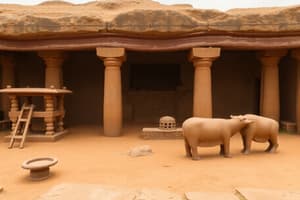Podcast
Questions and Answers
Flashcards are hidden until you start studying
Study Notes
Prehistoric India
- Evidence of human habitation dates back to 700,000 years.
- Major archaeological sites: Bhimbetka (rock shelters) and Mehrgarh (early agriculture).
Indus Valley Civilization (c. 2500–1900 BCE)
- Major cities: Harappa and Mohenjo-Daro.
- Known for urban planning, drainage systems, and brick buildings.
- Writing system remains undeciphered.
Vedic Period (c. 1500–500 BCE)
- Arrival of Indo-Aryans and composition of Vedas.
- Development of Hinduism, social hierarchies (varnas), and early political structures.
Maurya Empire (c. 322–185 BCE)
- Founded by Chandragupta Maurya; expanded by Ashoka.
- Ashoka's promotion of Buddhism and the spread of its teachings.
- Notable for the Edicts of Ashoka, which emphasized moral governance.
Gupta Empire (c. 240–550 CE)
- Considered the Golden Age of India for arts, science, and culture.
- Advancements in mathematics (concept of zero), astronomy, and literature.
- Flourishing of Hindu philosophy and temple architecture.
Medieval India (c. 600–1526 CE)
- Rise of regional kingdoms such as the Chola, Vijayanagara, and Rajput states.
- Introduction of Islam through invasions and trade, leading to cultural syncretism.
- The establishment of the Delhi Sultanate (1206–1526).
Mughal Empire (1526–1857)
- Founded by Babur; notable rulers include Akbar, Shah Jahan, and Aurangzeb.
- Cultural achievements in architecture (Taj Mahal), painting, and administration.
- Religious tolerance under Akbar; later, increased orthodoxy under Aurangzeb.
Colonial Period (1757–1947)
- British East India Company’s control following the Battle of Plassey (1757).
- Revolt of 1857 as the first major resistance against British rule.
- Indian National Congress formed in 1885, leading the struggle for independence.
Independence and Partition (1947)
- India gains independence on August 15, 1947.
- Partition leads to the creation of Pakistan, resulting in mass migrations and communal violence.
- Establishment of a democratic republic in 1950 with a secular constitution.
Post-Independence Era
- Economic reforms and the Green Revolution in the 1960s and 1970s.
- Liberalization of the economy in the 1990s, leading to rapid growth.
- Ongoing challenges: poverty, corruption, and communal tensions.
Prehistoric India
- Human habitation evidence dates back 700,000 years.
- Significant archaeological sites include Bhimbetka, known for rock shelters, and Mehrgarh, recognized for early agricultural practices.
Indus Valley Civilization (c. 2500–1900 BCE)
- Major urban centers included Harappa and Mohenjo-Daro.
- The civilization was advanced in urban planning, featuring sophisticated drainage systems and standardized brick buildings.
- An undeciphered writing system reflects a complex society.
Vedic Period (c. 1500–500 BCE)
- Marked by the arrival of Indo-Aryans and the formulation of the Vedas.
- Hinduism developed, introducing social hierarchies known as varnas and laying the groundwork for early political structures.
Maurya Empire (c. 322–185 BCE)
- Founded by Chandragupta Maurya and expanded significantly under Ashoka.
- Ashoka actively promoted Buddhism and facilitated its teachings across the empire.
- The Edicts of Ashoka highlighted principles of moral governance and ethical leadership.
Gupta Empire (c. 240–550 CE)
- Known as the Golden Age of India, a period of remarkable achievements in arts, sciences, and culture.
- Significant advancements included the concept of zero in mathematics, as well as developments in astronomy and classical literature.
- Hindu philosophy thrived, along with the construction of iconic temple architecture.
Medieval India (c. 600–1526 CE)
- Rise of regional powers such as the Chola, Vijayanagara, and Rajput kingdoms.
- Islam was introduced through invasions and trade, fostering cultural syncretism.
- The Delhi Sultanate was established, lasting from 1206 to 1526, influencing Indian society.
Mughal Empire (1526–1857)
- Founded by Babur, with notable rulers including Akbar, Shah Jahan, and Aurangzeb.
- The empire is famed for architectural masterpieces, including the Taj Mahal, and advancements in painting and administrative methods.
- Akbar promoted religious tolerance, which declined under Aurangzeb's orthodox policies.
Colonial Period (1757–1947)
- Control of India was seized by the British East India Company after the Battle of Plassey (1757).
- The Revolt of 1857 marked the first significant resistance against British colonial rule.
- The Indian National Congress was established in 1885, playing a crucial role in the independence movement.
Independence and Partition (1947)
- India achieved independence on August 15, 1947.
- The partition resulted in the creation of Pakistan, prompting mass migrations and significant communal violence.
- A democratic republic was established in 1950 with a commitment to a secular constitution.
Post-Independence Era
- Economic reforms in the 1960s and 1970s included the Green Revolution, enhancing agricultural productivity.
- The 1990s brought economic liberalization, contributing to rapid economic growth.
- Persisting challenges include poverty, corruption, and communal tensions within society.
Studying That Suits You
Use AI to generate personalized quizzes and flashcards to suit your learning preferences.




